 MANILA: China's benchmark iron ore futures jumped to a record high on Thursday, rising along with the rest of the country's ferrous complex on robust demand for the steelmaking feedstock amid falling stocks.
MANILA: China's benchmark iron ore futures jumped to a record high on Thursday, rising along with the rest of the country's ferrous complex on robust demand for the steelmaking feedstock amid falling stocks.
Expectations that steel demand in the world's top consumer will also remain strong buoyed prices of construction-used rebar and hot-rolled coil.
Surprisingly weaker growth in Chinese retail sales and industrial output for April added to pressure on Beijing to roll out more stimulus measures, sparking hopes of more investments in infrastructure that could further boost steel demand.
The most-traded September 2019 iron ore on the Dalian Commodity Exchange surged as much as 5.5% to 685 yuan ($99.63) a tonne, the contract's highest since 2013, before closing 4.8% higher at 680.5 yuan.
"It's because of some seasonal demand, which is quite strong, with some impact from the supply side," said a Shanghai-based trader.
Steel mills were replenishing their iron ore stocks as healthy profit margins encouraged them to boost output, the trader said.
"Profit margin is still good because we (also) have some restrictions on the production side for environmental protection," the trader said. "This situation will last maybe until autumn, or the third quarter of this year."
China's crude steel production rose 12.7% in April from March to its highest monthly level on record, official data showed on Wednesday, bolstered by firm demand and good profitability.
While China's iron ore appetite remains strong, port stocks <SH-TOT-IRONINV> have fallen to the lowest level since late 2017, as imports slumped to an 18-month low in April due to supply and production disruptions, particularly in Brazil.
The most-active October 2019 rebar contract on the Shanghai Futures Exchange climbed 1.8% to 3,742 yuan a tonne, rebounding from a five-week low hit earlier this week on concerns about the U.S.-China trade war.
Worries about the trade tensions have eased somewhat, as both sides are committed to continue negotiations to resolve their months-long dispute, after their tit-for-tat tariff war rattled financial markets in recent days.
"We estimate that a 25% tariff increase in prices for all Chinese goods will cause a 20% decline in export value, costing China 0.5% of GDP," ANZ said in a note.
"We believe that China will require more stimulus measures to offset the impact of the declines in its exports," the bank said.
Hot-rolled coil rose 1.2% to 3,652 yuan a tonne.
Other steelmaking raw materials also extended gains, with coking coal up 1.4% at 1,369 yuan a tonne and coke climbing 1.3% to 2,139 yuan.






















Comments
Comments are closed.